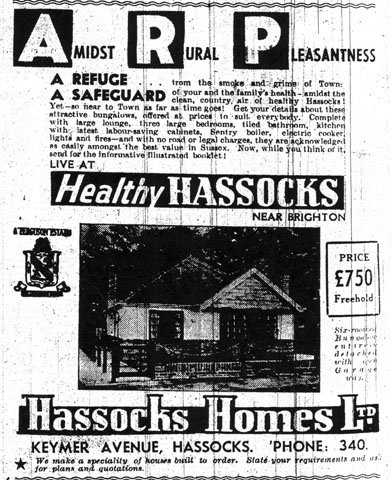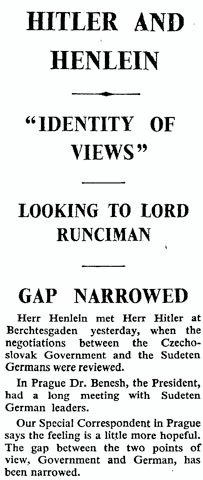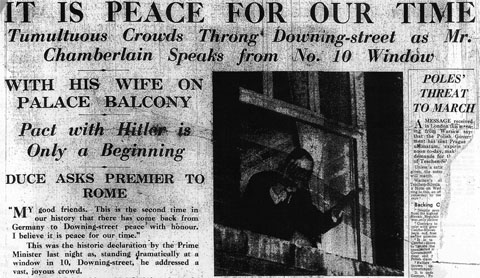
Good news, bad news in these headlines from The Times (p. 10) ... On the positive side, the Sudeten leaders have agreed to resume negotiations with the Czechoslovakian government. This may be related to a report into the Mährisch-Ostrau incident by a British observer, Major Sutton-Pratt, who concluded that it had been blown out of all proportions: clearly not a very good reason to break off talks. The situation in Prague is described as 'a little easier'.
But the German press is now fuming over 'the alleged cruelties perpetrated in the dungeons of Prague against the Sudeten Germans, which makes extremely unpleasant reading', in a spirit expressed 'with a unanimity which has ceased to be surprising'. And Hitler, in an address at Nuremberg to his Gauleiters (supposedly 180,000 of them) is talking tough:
In these long years you have been tried out and hardened, and have experienced for yourselves what strength there is in a community indissolubly bound together and determined to capitulate to none. You make it easy for me to be your Leader to-day. All those who count on the weakness of Germany to-day will find themselves just as mistaken.
And he's due to make another speech at Nuremberg on Monday, specifically on foreign policy. There's understandable nervousness about what he's going to say.
The Daily Mail seems to have scooped The Times and the Manchester Guardian today with some late-breaking news.1 Wilson Broadbent, the diplomatic correspondent, reports (p. 9) that:
THE British Government decided just before midnight last night to inform the German Government in precise and formal terms that Britain will not stand aside if Czecho-Slovakia is the subject of military aggression.
Chamberlain took this decision after long talks with Halifax, Simon, Sir Robert Vansittart (Chief Diplomatic Adviser) and Sir Alexander Cadogan (Permanent Under-Secretary, Foreign Office). The British Ambassador to Germany, Henderson, will deliver the note to Hitler in person. So, depending on where one fell on the pro-appeasement/anti-appeasement spectrum, this could be seen as bad news or good news. It's exactly what Labour and the Trades Union Congress called for this week, so they'll be happy.
Unlike yesterday, The Times has a number of letters (p. 11) about its secession leader. John Fischer Williams, a prominent international lawyer, can't understand why the Czech government is reportedly not very keen on 'so wise a suggestion'. H. Wansey Bayley, a Harley Street doctor, thinks that if we want peace then we should openly stand beside Czechoslovakia, France, Russia and Romania. And Hilda Ormsby, Reader in Geography at the London School of Economics, makes some criticisms on population, strategic and cultural grounds: for example, that the loss of the mountains on the border would make Czechoslovakia indefensible, or that the Sudetens of northern Bohemia would be joined to neighbouring Saxony, when they are actually descended from Bavarians or Austrians.
Finally, here's an ad from the Daily Mail (p. 14), offering new bungalows for sale at Hassocks in Sussex:

The first thing that some readers will notice is the price -- £750 for 3 bedrooms, including land! That's the equivalent of about £34,000 in 2007 terms, according to this. Sounds like a bargain, especially since the kitchen comes with the 'latest labour-saving cabinets'!
But have a look at the odd phrase up the top:
AMIDST RURAL PLEASANTNESS
A - R - P ... ARP ... hmmm, I don't think it's just a coincidence that those initials were widely understood to refer to air raid precautions. The opening spiel confirms this, I think:
A REFUGE ... from the smoke and grime of Town.
A SAFEGUARD of your and the family's health -- amidst the clean, country air of healthy Hassocks!
It seems pretty clear to me that this is a sly, yet quite transparent, attempt to use the fear of bombing to sell country holiday homes to the middle class as places to which you can evacuate your family when the knock-out blow threatens. What I wonder, though, is whether the fact that it is being published now is significant? Was Hassocks Homes Ltd. attempting to cash in on the crisis? Because otherwise, ads of this type are rare, in my experience.
A leader in the New Statesman today says (p. 366) that if war comes, it would stop Germany, but 'It would probably also end European civilisation'.
![]() This work is licensed under a Creative Commons Attribution-NonCommercial-NoDerivatives 4.0 International License.
Permissions beyond the scope of this license may be available at http://airminded.org/copyright/.
This work is licensed under a Creative Commons Attribution-NonCommercial-NoDerivatives 4.0 International License.
Permissions beyond the scope of this license may be available at http://airminded.org/copyright/.
- I wondered if maybe this was from a late edition, but it doesn't appear so. Some newspapers had a morning and an afternoon edition, the Guardian did, I believe. But historians don't routinely make a distinction when citing them, or at least I've never seen them do so. Conceivably, this could be a problem -- after all, the two editions are going to be different, and have some different articles in them, or else there'd be no point in having multiple editions. But when you go through the Guardian microfilm, there's only one edition of the paper for each day. So what happens if you want to check the other edition? Hopefully somebody somewhere has these, but who knows where. And there's no doubt a temptation for libraries to ditch such bulky, mouldy items as newspapers once they are available on microfilm or online ... but they may not be replacing like with like. [↩]





Chris Williams
All this is great Brett.
As for Hassocks, I think that it's more likely to be appealing to middle class commuters in London to move themselves and their families right out of town right now, rather than as a second-home bolthole. Hassocks was (and is) on the main line from London to Brighton, which was electrified by then, so it's within easy commuting distance of the City. It's undoubtedly a call to flee the cities, though. In any case, the thing about the knock-out blow is that it comes out of the blue.
Brett Holman
Post authorAh, that sounds right enough, and fits the text better. I think I was thrown by the word 'bungalow', over here that would generally mean a holiday home or other small dwelling, but it seems it might mean just a house generally in UK parlance?
JDK
Bungalow is originally a term from India, but is one of those annoying shifting signifiers in English. In the UK it means a one floor permanent dwelling, generally a less prestigious house. One used for a holiday would generally be referred to as a holiday bungalow. However Brits would and do refer to one level Australian houses as 'bungalows'. It's as bad as 'cottage'. A wooden (usually) holiday home in Canada, a stone built twee dwelling in Britain, beloved of tourists (I used to live in one, called Chapel Cottage) and a rather dubious term in the gay cruising scene for a public toilet in the UK. Don't start me on canoe / kayak / Canadian canoe!
http://en.wikipedia.org/wiki/Bungalow
Brett Holman
Post authorThanks! Silly English language.
Pingback:
Airminded · Monday, 12 September 1938